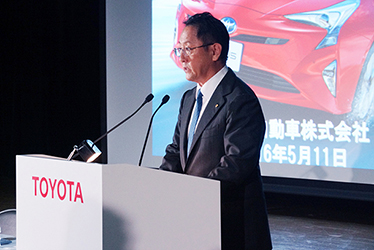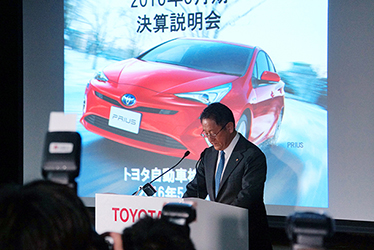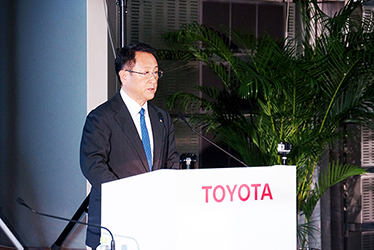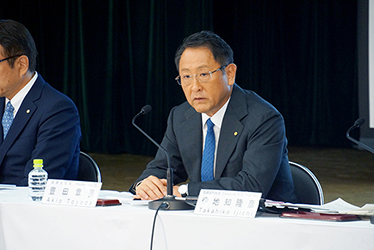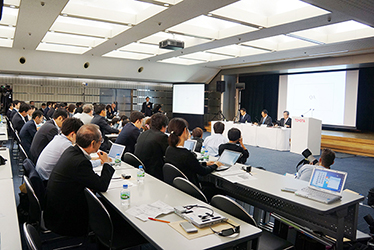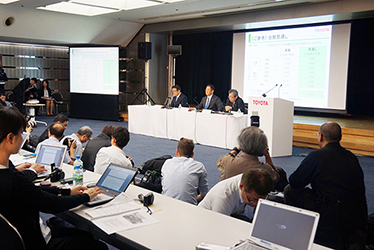May. 11, 2016
Financial Results for the Fiscal Year Ended March 2016:
Prepared Remarks by President Akio Toyoda
Good afternoon everyone, and thank you all very much for taking the time to join us today.
First, on behalf of everyone at Toyota, I would like to offer my heartfelt condolences to those affected by the recent series of earthquakes in Kumamoto Prefecture, as well as their families and friends.
We are praying for a swift recovery in and around the stricken area.
Looking back on the fiscal year that ended on March 31, we achieved an operating income of 2 trillion 853.9 billion yen, due to concerted group-wide cost reduction efforts, coupled with the depreciation of the yen.
I would like to take this opportunity to thank each and every one of our customers around the world for choosing us. We are also deeply grateful to our dealers, suppliers, and all our other stakeholders for their invaluable support.
The year-end dividend for our common stock shareholders will be 110 yen per share. As a result, the total annual dividend will be 210 yen per share, including the 100 yen per share that we paid as an interim dividend. We also plan to implement a new share buyback up to a maximum of 500 billion yen, or, an upper limit of 100 million shares.
To reward our shareholders, we will continue making every effort to improve our corporate value and ensure stable and sustainable returns.
Before we move on to the details of our financial results, I would like to briefly talk about my business philosophy.
Over the years, we have faced a wide range of challenging issues, such as the financial losses after the global financial crisis, the recall crisis, and the Great East Japan Earthquake. However, despite these issues, we have consistently maintained one aim: achieving sustainable growth.
So, what are the conditions necessary to achieve sustainable growth?
Personally, I have focused primarily on building a sustainable foundation to create ever-better cars, and the development of human resources. After all, there is no use in swinging between elation and despair every time sales and earnings decrease, remain flat, or rise.
Rather, we are steering our business based on the yardstick of personal growth. This means focusing on giving people the encouragement and tools to make judgments and act based on the concept of genchi genbutsu, in order to attain our goal of making ever-better cars.
During last year's announcement, I mentioned that we had shifted from an intentional pause to strengthen competitiveness towards an "implementation phase," and that we would start making new, purpose-driven, investments.
In doing so, we have three main goals.
The first is to become a company that is capable of making steady progress toward the creation of ever-better cars.
The second is to sow the seeds for growth in both existing automotive fields and in fields beyond the conventional boundaries of our business as a challenge for the future.
The third is to build a strong financial foundation capable of withstanding another event like the global financial crisis.
- The challenge of creating ever-better cars, as exemplified by TNGA;
- The challenge of creating ever-better plants, as exemplified by our new factory in Mexico; and
- The challenge of new value creation, as exemplified by the Toyota Research Institute (TRI).
From a financial standpoint, we believe that we have built up the strength to take on these challenges. However, our initiatives are still in the implementation phase.
We have benefited from an exchange rate tailwind that has helped raise our earnings above the level of our true capabilities. Although this has enabled us to take on new challenges, that set of circumstances is likely to change for the worse this year.
I accept this change as an opportunity that can help us achieve our challenges.
Toyota has become too big to respond speedily to severe changes in the business environment. This prompted us to start finding ways to overhaul our working practices, and in April this year, we implemented a wide-reaching reorganization.
We have taken another step toward creating ever-better cars by splitting our organization into smaller independent and product-focused companies. We made this decision because products are the starting point for our efforts to create ever-better cars.
In fact, Lexus set the precedent for this change.
We showed the LC 500 at the Detroit Motor Show in January this year. I think that the LC 500 coupe is the type of model that could never survive as part of Toyota's 10-million unit production plan.
However, we set up Lexus International in June 2012 as a precursor to the new company system. As a highly flexible and nimble organization, Lexus International provided the driving force behind the decision to produce the LC 500.
Under a system of smaller companies, cars that might seem insignificant alongside a figure like 10 million may have a better chance of survival.
The things that customers value in their cars, and the way that customers use their cars vary greatly. That's why we will leave it to each company to determine their priorities in terms of performance, design, and value. This will enable us to be more flexible than ever in providing the cars that our customers want.
In the future, the product lineup of each company is likely to change in the same way as it did with Lexus. In fact, one aim for the future is to bring about radical change to the very idea of the car itself.
Another way that we will take on the challenge of overhauling our working practices is through alliances.
For example, the development of small cars has been one of our weaknesses.
Rather than being obsessed with doing everything ourselves, we are aiming to enhance competitiveness by reaching out to partners such as Daihatsu and sharing ideas for creating ever-better cars.
There are many lessons that we learned through developing the 86 with Subaru, and also through our alliances with Mazda and BMW. These lessons extend to the use of resources and money as well as learning about passion, speed of decision-making, and manufacturing technology. Our alliances offer us valuable opportunities to learn why we could not do things that our partners could.
Collaboration with our competitors is also one form of stimulus that will help us improve how we work. It was one of the major reasons why we took the decision to adopt a new organization. I think the results of our alliances contributed to that as well.
Rather than stopping short at simple capital tie-ups or joint product development, alliances are an excellent opportunity to help us create ever-better cars and to identify key ways to strengthen our global team.
Through alliances, we can objectively review our own competitiveness and the way we use our financial resources to bring about change in the way we work.
I mentioned that our circumstances are likely to change in the future. This does not simply refer to changes in our short-term business environment and profits. It is also a fact that mobility itself is reaching a critical turning point.
We want to embrace that momentous change, and actively work to create types of new value that cannot be generated within the boundaries of the conventional automotive business.
The Toyota Research Institute, established in January this year, is one such initiative.
For me, TRI is like the Automobile Department that Kiichiro Toyoda established within the Toyoda Automatic Loom Works, the predecessor of Toyota Motor Corporation, in 1930. Back then, he took on the challenge of making a substantial paradigm shift―going from building automatic looms to building cars. Together with TRI, we are creating the opportunity to make another fundamental change in our business model.
Automated driving and robotics are challenges that affect us closely. However, artificial intelligence is a vital basic technology for many industries outside of the automotive industry as well.
We are aiming to create new types of value that can contribute to society above and beyond the perceived scope of our own industry. We will support the activities of Dr. Gill Pratt, TRI's CEO, and his team by providing the freedom to face these challenges.
Finally, I would like to sum up my feelings about the current fiscal year.
I think that this year will be a test of whether we can transform our intentions into reality.
We are prepared for our circumstances to change this year, and as such, we have already worked hard to strengthen our competitiveness and build a robust financial foundation.
Rather than simply reacting to events as they occur, we must always be ready to overcome any circumstances and face up to the changes ahead without wavering from our core goals.
Until now, we based our approach on a certain set of theories. But now that we are taking actions toward sustainable growth, rules have changed, and so, therefore, must those theories.
We need to show the strength of will to forge new roads so that we can continue taking on challenges for the future, to build ever-better cars and develop an ever-stronger global team.
Thank you in advance for your continued understanding and support.





